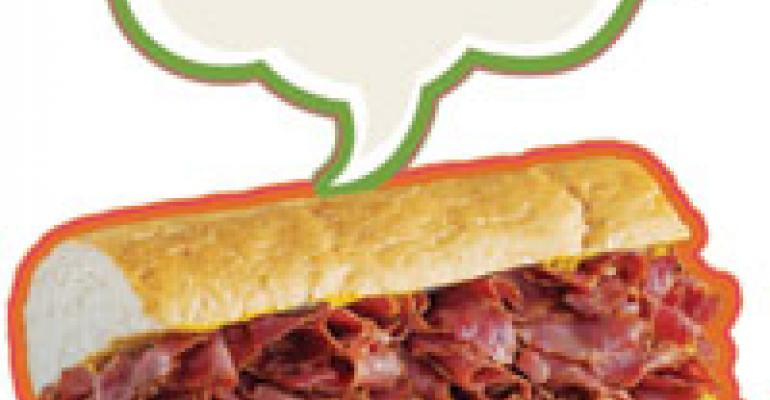Togo’s Sandwiches hasn’t opted out of the discount wars. To compete against Subway’s $5 foot-longs and Quiznos’ $4 Toasty Torpedoes, Togo’s developed its own value-focused deals, such as $3.99 daily specials on 6-inch subs.
But that doesn’t mean the 242-unit chain was prepared to cut the price on its signature Hot Pastrami sandwich. Instead, it bucked the how-low-can-you-go trend and launched the “Togo’s Pastrami Guarantee,” announcing Sept. 23 on in-store materials and through the media that it would give a refund to any customer who felt the sandwich didn’t stack up against a “skimpy breadwich” from any competitor.
So far, sales of the Hot Pastrami sandwich—at full price—have increased 15 percent, and only eight customers have asked for a refund, said Renae Scott, vice president of branding and marketing.
While financial anxiety has driven many chains to discount heavily, brands like Togo’s, Burgerville and The Pump Energy Food have developed offerings or marketing strategies that accentuate quality instead of price. Officials of those brands say the rewards in sales and traffic have been worth the marketing and training dollars put at risk.
“You have to balance price and quality, and you can’t live without one or the other,” Scott said. “While others are hammering value, we decided to take another tack in a way we thought would drive traffic. A money-back guarantee on our best-selling sandwich would get folks [who’d been] going to our competitors for price to come try us with no financial risk.”
Yet Togo’s guarantee doesn’t neglect value, Scott said, noting that guests keep their money if they’re not satisfied.
“Even some of our competitors have advertised their version of a pastrami sandwich, but we felt it was important to go head to head,” she said. “[The campaign] speaks to the economy right now by alleviating any financial risk. It’s kind of a perfect strategy for this time. It speaks to quality, but it also speaks to the nervousness consumers have about spending money on a product they may or may not like.”
Customers have been willing to pay full price for Burgerville’s monthly, limited-time offerings featuring locally sourced, in-season ingredients, said Jeff Harvey, chief executive of the Vancouver, Wash.-based chain. Last month the brand showcased local apples in its Haute Dog with Apple Slaw and the Apple & Peppered Bacon Turkey Club.
The prices for the gourmet LTOs aren’t included on billboards or radio spots, Harvey said. But when customers come in to try the items, Burgerville makes the effort to eliminate sticker shock.
“Everything we designed has been done with clear boundaries for pricing,” he said. “They have to fit in with the whole menu mix. They can’t be way outside our normal menu prices.”
Burgerville says some of the LTOs averaged sales of 3,000 units per day across the 39-unit system.
“With the introduction of the monthly, gourmet LTOs, we have definitely seen increased guest counts and revenues in our restaurants,” Harvey added.
Having a cohesive team among the research and development, purchasing, and operations departments has helped Burgerville maintain workable margins on the offerings, Harvey added. The chain will give customers pricing options on the LTOs going forward by developing different sizes at tiered prices.
Burgerville’s average check runs about $8.50, due to its local sourcing and sustainable-business efforts—meaning the chain would have to sell out to compete with other quick-service burger chains on price, he said.
“If we entered those burger wars, we’d have to sacrifice our brand positioning,” he said. “It’s cyclical, and there will be a time when they’re not all battling on price. Then when the market shifts, our strategy is to always be differentiated on quality and experience.”
The Pump Energy Food, a six-unit fast-casual brand in New York City, is in a similar position, said chief executive Adam Eskin. Because the health-focused chain’s food costs are relatively higher than those of quick-service brands competing for breakfast and lunch sales, The Pump needs to show customers that it approaches quality and value differently.
For instance, Eskin said, the chain’s best-selling protein, the 12-Hour Turkey Breast, is marinated in citrus juices and ginger for three hours, braised overnight and shredded by hand.
“There are no ways to cut that corner,” Eskin said. “What we’d rather do is explain that this is what we do with our turkey every night, and the care and the effort that goes into it. Could you get a turkey breast at Subway that’s been shipped in with preservatives? Of course you could. But please understand that what we’re doing is different in terms of freshness and nutrition.”
Marketing that message of quality involves everything from printing slogans on crew members’ T-shirts to training staff to educate customers about the menu to investing in upgrades to the brand’s website.
Whether the medium is an in-store poster or a knowledgeable cashier, Eskin said, the message from The Pump is that value means getting high-quality food for the price.
“It’s important for us to get our message across that we do something slightly different,” he said, “and we want customers to understand what we do and how much we care. We don’t want to beat people over the head with it, and we don’t want to get into this pricing war. If we did that, our business model would no longer work.”— [email protected]

